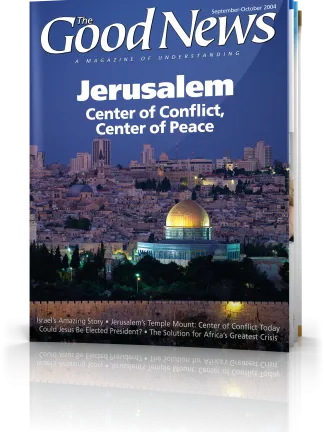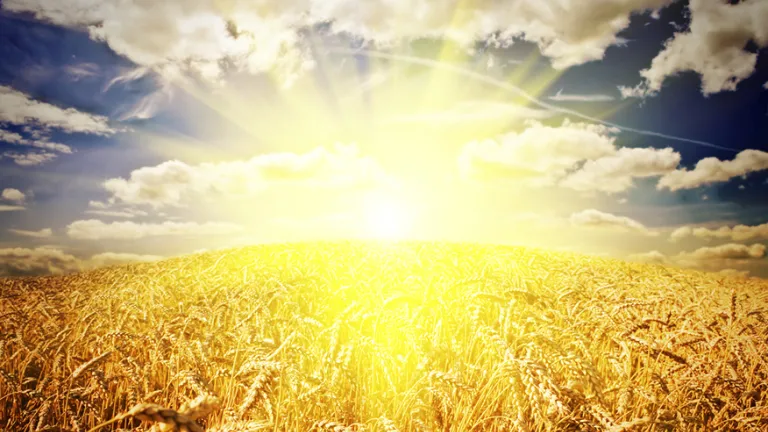The Biblical Festivals That Show How God Will Bring World Peace

Will mankind ever experience lasting peace? Humanity's track record isn't very good. But a series of biblical feasts reveals how God will indeed bring lasting world peace!
History shows that the greatest barrier to world peace is our human nature. No segment of society escapes the cruelties it causes. Self-serving ambition, lust for power, prejudice and greed are only a few of humanity's dark traits that regularly defeat the best of good intentions.
Conflicts arising from our selfish attitudes and choices victimize families and communities just as relentlessly as they do entire nations. We long for a solution, but can't seem to find one that will endure.
Yet there is an answer, and the God who created us has revealed His intent to miraculously transform our nature so that peace will become possible!
In the Holy Scriptures He is described as "the God of peace" (Hebrews 13:20). The Scriptures also refer to His Son Jesus Christ as the "Prince of Peace" and promise, "Of the increase of His government and peace there will be no end . . ." (Isaiah 9:6-7).
They foretell a time when "He will judge between the nations and will settle disputes for many peoples. They will beat their swords into plowshares and their spears into pruning hooks. Nation will not take up sword against nation, nor will they train for war anymore" (Isaiah 2:4, New International Version).
But for now peace continues to be an elusive dream because, as those same Scriptures say of us, "the way of peace they have not known" (Romans 3:17).
Landmarks in God's road map to peace
Mankind simply doesn't know the way to peace! The only sure way to lasting peace is through changing what is inside us. It's futile to hope that merely placing restraints on man's outward behavior will produce a permanent state of tranquility!
God's plan for changing human nature is the most ancient of all road maps to world peace. It embodies seven successive steps, each vital to solving our human nature problem. Its focus is on transforming humanity from the inside out. And God assures us that it will eventually bring lasting peace!
We often celebrate special events. Many celebrations are memorials of landmark events that have shaped our family, community, nation or society.
God has ordained seven unique celebrations that highlight the key landmark events in His plan to create and sustain world peace. Jesus Christ personally observed all seven of these celebrations (in fact, He was crucified on one of them, the first one). These religious festivals celebrate the immense contributions that He has made or will make toward transforming humankind into the righteous and peaceful children of God.
These celebrations are holy festivals that God instituted when He was transforming the descendants of Jacob (grandson of Abraham) from a slave people into an independent nation under His rule. Several great themes are depicted.
One theme is that of a people who are freed from slavery so they can serve God. When the nation of Israel was freed from Egyptian bondage, they knew they were being rescued from physical slavery.
What they didn't understand at that time was that their newly acquired freedom from physical slavery was symbolic of God's plan to liberate, in the future, all peoples and nations from their slavery to sin (Romans 6:3-6). The New Testament Scriptures explain that man's enslavement to sin is caused by his fleshly desires that incite the evil tendencies of his human nature (Romans 7:22-23; James 4:1).
Another theme in God's seven annual festivals is that of a harvest. This is the grand theme that pervades all of these feasts. Their dates are set according to the agricultural harvest seasons of the Holy Land. For this reason, they sometimes are called the harvest festivals.
But the implications of these festivals go far beyond the realm of agriculture. They lay before us the seven crucial steps in God's plan to harvest—to gather—human beings into His everlasting family.
Jesus Christ explained this so clearly! "Do you not say, 'Four months more, then comes the harvest'? But I tell you, look around you, and see how the fields are ripe for harvesting. The reaper is already receiving wages and is gathering fruit for eternal life, so that sower and reaper may rejoice together.
"For here the saying holds true, 'One sows and another reaps.' I sent you to reap that for which you did not labor. Others have labored, and you have entered into their labor" (John 4:35-38, New Revised Standard Version, emphasis added throughout).
The first three festivals
The first step in God's plan is symbolized through the divinely ordained festival called the Passover (Exodus 12:21; Deuteronomy 16:1-2). It reminds us annually that Jesus Christ was put to death so that we can receive forgiveness of sin. By recognizing and repenting of our sinful behaviors and attitudes that flow from our selfish nature, we all may receive this forgiveness.
Anciently, the Passover was observed by slaughtering a lamb—which represented the future sacrifice of Christ. At the beginning of Christ's ministry, John the Baptist "saw Jesus coming toward him, and said, 'Behold! The Lamb of God who takes away the sin of the world!'" (John 1:29).
The Passover commemorates what Jesus Christ has done in offering His own life to pay for the guilt of all who will repent.
Jesus and His disciples kept this festival (Mark 14:12-14; Luke 22:13-15), setting the example we should follow (1 John 2:6). And the apostle Paul explicitly stated that Christians should continue following that example (1 Corinthians 11:23-28).
The second step in God's plan is celebrated as the Days of Unleavened Bread. Paul explains the spiritual significance of this seven-day period alongside that of the Passover: "Therefore purge out the old leaven, that you may be a new lump, since you truly are unleavened. For indeed Christ, our Passover, was sacrificed for us. Therefore let us keep the feast [of Unleavened Bread], not with old leaven, nor with the leaven of malice and wickedness, but with the unleavened bread of sincerity and truth" (1 Corinthians 5:7-8).
God delivered the ancient Israelites, following their celebration of the Passover, from Egyptian slavery during the days of this festival. That national deliverance figuratively represented God's commitment to deliver in the future all peoples, once they accept Christ's sacrifice, from the negative pulls of their human nature.
As Paul explains to those who have already repented, accepted Christ's sacrifice and begun striving to overcome sin and put it out of their lives: "We know that our old self was crucified with him so that the body of sin might be destroyed, and we might no longer be enslaved to sin . . . But thanks be to God that you, having once been slaves of sin, have become obedient from the heart to the form of teaching to which you were entrusted, and that you, having been set free from sin, have become slaves of righteousness" (Romans 6:6, 17-18, NRSV).
The third step in this divine plan is celebrated as the Day of Pentecost (Acts 20:16). It also is referred to as "the Feast of Weeks" and "the day of the firstfruits" (Numbers 28:26). James 1:18 tells us that "of His own will He brought us forth by the word of truth, that we might be a kind of firstfruits of His creatures."
It was on the Day of Pentecost that the New Testament Church was first established. What made this event so special was the miraculous change, through the gift of the Holy Spirit, that God made in the minds and hearts of those who were converted on that day (Acts 2:1-4).
The time had finally come for God to begin changing a selected body of people from within. Jesus calls those who receive this marvelous transformation of their innermost nature in this present age His "little flock" (Luke 12:32).
Though few in number in proportion to the masses of humanity, their vital mission is to be "the light of the world" until He returns (Matthew 5:14). Not everyone who now claims to follow Jesus Christ has truly repented and received the Spirit of God (Matthew 7:20-21). Therefore, the time of removing completely the spiritual blindness that plagues humanity is yet in the future.
The global implications of the great autumn celebrations
The first three festivals of the spring harvest season represent those initial steps that are essential for preparing the way for the massive global renewal that will occur in the future. This global revitalization is pictured by the last four festivals. All are observed in the autumn (in the northern hemisphere), as the autumn harvest in the Holy Land is being gathered and stored.
God intentionally set them at this time to represent the key aspects of His great spiritual harvest of all nations and peoples. They point to the time when Jesus Christ will assume control over the affairs of the whole world. Ushering in a new age, He will at last rid the world of armed conflicts, deception and spiritual blindness.
The Kingdom of God was the main theme of the gospel message Christ preached at His first coming. "Now after John was put in prison, Jesus came to Galilee, preaching thegospel of the kingdom of God, and saying, 'The time is fulfilled, and the kingdom of God is at hand. Repent, and believe in the gospel'" (Mark 1:14-15).
The word "gospel" means good news. Jesus' gospel was the good news that the Kingdom of God, which Jesus will establish over all nations at His second coming, will address and solve all of humanity's problems! Global peace will rank high among His most urgent priorities.
Let's now see what these sacred festivals reveal about that coming time of global reform.
Jesus Christ takes command
The fourth step in God's master plan is celebrated by the Feast of Trumpets. It represents the return of Jesus Christ as the King of Kings to establish the Kingdom of God over all the earth at the sound of a great trumpet blast.
Notice descriptions of this crucial event in the Scriptures: "The seventh angel sounded his trumpet, and there were loud voices in heaven, which said: 'The kingdom of the world has become the kingdom of our Lord and of his Christ, and he will reign for ever and ever'" (Revelation 11:15, NIV).
"For the Lord Himself will descend from heaven with a shout, with the voice of an archangel, and with the trumpet of God. And the dead in Christ will rise first" (1 Thessalonians 4:16).
Not only will Jesus Christ assume command over all the earth, but also all those who have served Him faithfully will be resurrected from the dead to become His executive staff: "And He will send His angels with a great sound of a trumpet, and they will gather together His elect from the four winds, from one end of heaven to the other" (Matthew 24:31).
"Then the kingdom and dominion, and the greatness of the kingdoms under the whole heaven, shall be given to the people, the saints of the Most High" (Daniel 7:27).
"Blessed and holy is he who has part in the first resurrection. Over such the second death has no power, but they shall be priests of God and of Christ, and shall reign with Him a thousand years" (Revelation 20:6).
The great deceiver is removed
The fifth step in God's master plan is foreshadowed by the Day of Atonement. In ancient Israel it was on the Day of Atonement that the entire nation was ceremonially cleansed of sins committed in ignorance (Leviticus 16:29-34; Hebrews 9:7). Figuratively, this cleansing ceremony looked forward to the real cleansing of the entire world of its spiritual ignorance and blindness.
The Scriptures reveal that the one being most responsible for humanity's spiritual ignorance and deception is Satan the devil (Revelation 12:9). Therefore, one of the first events to occur after Christ returns is the binding and banishment of this great deceiver.
"And I saw an angel coming down from heaven, having the key of the abyss and a great chain in his hand. And he laid hold of the dragon, the serpent of old, who is the devil and Satan, and bound him for a thousand years, and threw him into the abyss, and shut it and sealed it over him, so that he should not deceive the nations any longer . . ." (Revelation 20:1-3, New American Standard Bible).
In ancient Israel this deceiving spirit being was represented symbolically by a goat that, on the Day of Atonement, was banished into the wilderness (Leviticus 16:21). With the influence of the devil then removed, all people of the world can become reconciled to God, through the atoning sacrifice of Christ. How different from today!
A millennium of global restoration
The sixth step in this sacred plan is celebrated by the Feast of Tabernacles or the Festival of Ingathering. This seven-day period represents the first 1,000 years of the restorative rule of Jesus Christ on earth. During the first part of His rule He will use several techniques to convince a deceived world that He really is the divine Son of God with the power to give or refuse blessings.
First He will establish Jerusalem as the capital of His kingdom (Zechariah 14:1-9). After that, "Many nations will come and say, 'Come, let us go up to the mountain of the Lord, to the house of the God of Jacob. He will teach us his ways, so that we may walk in his paths.' The law will go out from Zion, the word of the Lord from Jerusalem.
"He will judge between many peoples and will settle disputes for strong nations far and wide. They will beat their swords into plowshares and their spears into pruning hooks. Nation will not take up sword against nation, nor will they train for war anymore" (Micah 4:2-3, NIV).
But not every nation will cooperate immediately. Many will have to learn the hard way just how fully Christ can control every aspect of the entire earth. "And it shall come to pass that everyone who is left of all the nations which came against Jerusalem shall go up from year to year to worship the King, the Lord of hosts, and to keep the Feast of Tabernacles.
"And it shall be that whichever of the families of the earth do not come up to Jerusalem to worship the King, the Lord of hosts, on them there will be no rain . . ." (Zechariah 14:16-19)
Christ's righteous rule will soon secure a peace the world has never before known. "Of the increase of His government and peace there will be no end, upon the throne of David and over His kingdom, to order it and establish it with judgment and justice from that time forward, even forever. The zeal of the Lord of hosts will perform this" (Isaiah 9:7).
Hope for the unsaved dead
At Christ's return only those who have faithfully served and obeyed God over the centuries are resurrected. Yet Paul explained that "God our Savior . . . desires all men to be saved and to come to the knowledge of the truth" (1 Timothy 2:3-4). And Peter said: "The Lord is . . . not willing that any should perish but that all should come to repentance" (2 Peter 3:9).
What, then, happens to the rest of the dead who have never repented or really understood about God and His way of life? Is there any hope for them? Indeed there is! God has also taken them into account.
The seventh step in God's master plan celebrates their hope in the Holy Day that immediately follows the last day of the Feast of Tabernacles. Since the last event in God's plan of salvation mentioned in the Bible is the Great White Throne Judgment that immediately follows the 1,000-year reign of Christ (Revelation 20:11-15), this Holy Day represents the conclusion of God's final judgment concerning the destiny of human beings.
Concerning those who died without repenting, the Scriptures explain, "But the rest of the dead did not live again until the thousand years were finished" (Revelation 20:5).
After the 1,000 years expire, the apostle John explains what happens next: ". . . I saw the dead, small and great, standing before God, and books were opened. And another book was opened, which is the Book of Life. And the dead were judged according to their works, by the things which were written in the books" (Revelation 20:7; Revelation 20:12).
Jesus clearly included both Israelites and gentiles in that resurrection (Matthew 11:21-24; Matthew 12:41-42). Those who at that time accept God's teaching and repent will be given His Spirit through which they also may receive eternal life (Ezekiel 37:1-14; Romans 8:11).
A plan that guarantees peace
On its own, mankind has never discovered a lasting way to peace. Yet, through these biblical festivals, God has revealed how He plans to bring peace to the entire world. We can never achieve it on our own, which is why Jesus Christ must return.
If you'd like to experience a foretaste of the coming time when Jesus Christ will reeducate the entire world in God's way of life, visit one of the Feast sites located around the world. Following God's command and Christ's example, thousands of Good News readers gather each year to keep the festivals that celebrate these great events in God's plan. You're welcome to join us!







